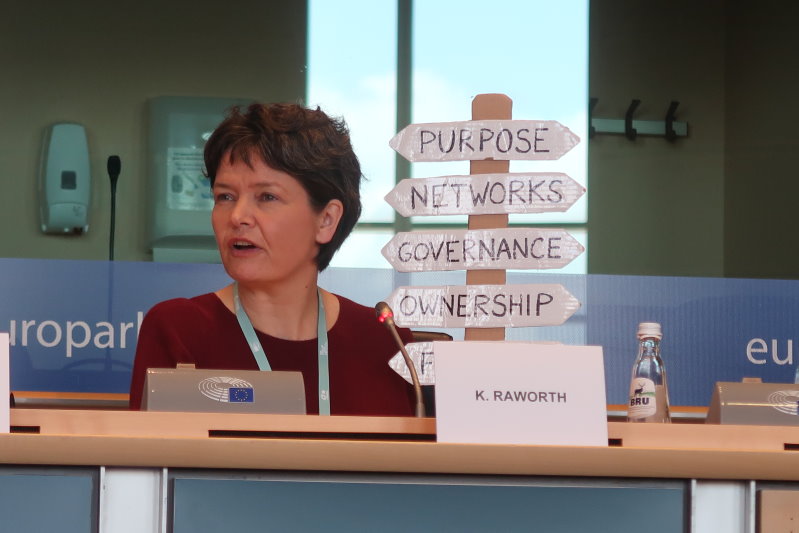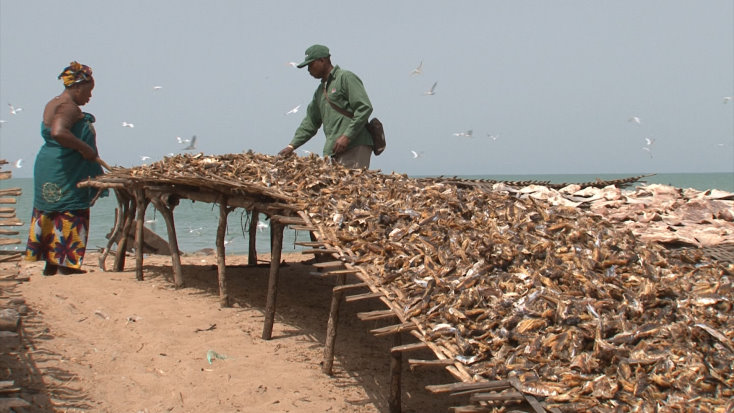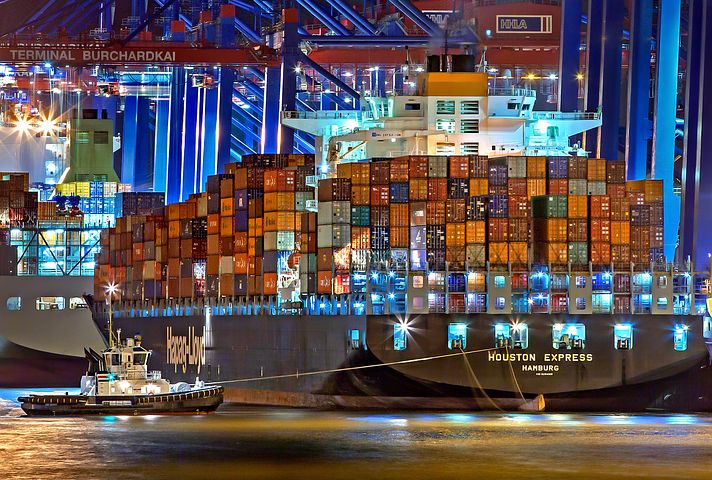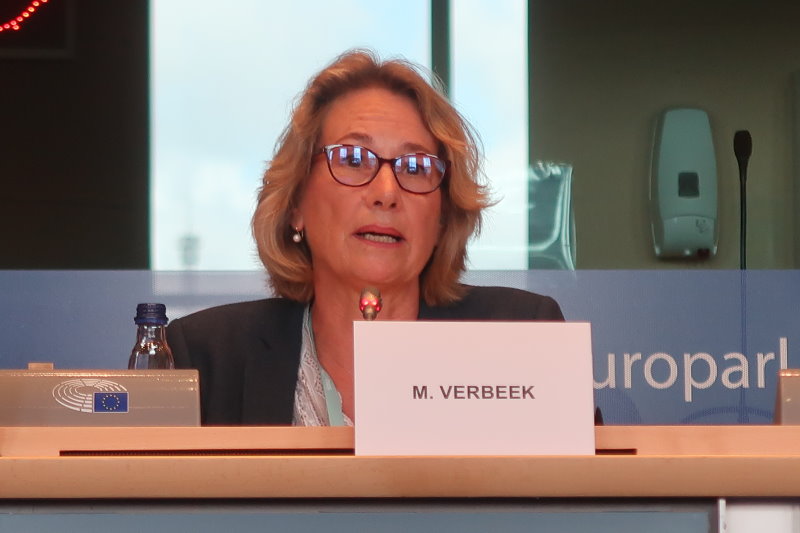Blue Doughnut - Recover and protect - for a healthy ocean
What about the ocean that covers some 70% of the planet's surface and is by a long margin the biggest connect ecosystem?
The Blue Doughnut was at the centre of a session on Day 2 of the conference, organised by Seas at Risk with moderation by MEP Dino Giarusso from Sicily. Monica Verbeek, Executive Director of Seas a Risk opened the panel contributions inviting the ocean to the conversation to pay tribute to its fundamental importance to the air we breathe, the climate, food, jobs, recreation and more. Developing good understanding of the biophysical boundaries of the ocean as the outer limit of the doughnut and the human and social dimensions as the inner limitation was still in its infancy.
Kate Raworth of Oxford University and creator of the original 'doughnut' concept suggested to adapt and modify the basics as required to meet the needs of driving towards ocean recovery and health. She also suggested to use five criteria for engaging with companies in the maritime industries:
(1) purpose - in service of life?,
(2) networks - quality of relationships,
(3) governance - who has voice and which metrics are used to measure success?
(4) ownership - family, shareholders, employees, cooperative?
(5) finance - what is the expected return servicing the purpose?
 Hans Bruynickx, Executive Director of the European Environment Agency (EEA), reminded participants in a soft-spoken, yet forceful manner that isolating the ocean from action towards transitions was incompataible with observed realities. Anything short of ecosystem management was inacceptable. He strongly criticised opposition to urgent ocean protection and pleaded to
Hans Bruynickx, Executive Director of the European Environment Agency (EEA), reminded participants in a soft-spoken, yet forceful manner that isolating the ocean from action towards transitions was incompataible with observed realities. Anything short of ecosystem management was inacceptable. He strongly criticised opposition to urgent ocean protection and pleaded to
- stop drilling in the ocean
- stop dumping waste into the ocean
- stop depleting renewable ocean resources
- stop 'developing' if it is having a negative impact on the tired ocean
- stop dividing and destroying the global commons.
Ingrid Kelling, Director of the Global Centre for Social Sustainability in Seafood Supply at the Heriot Watt University in Edinburgh, added explanations and a strong plea in favour of small-scale fishers, men and women, who represent 95% of the work force in the sector. Even beyond the abuses associated with illegal, unregulated and unrecorded (IUU) fishing, fishers and fish workers were at the receiving end of overfishing and poor labour standards in many places. Moreover, huge quantities of the precious resource were wasted instead of systematically using the whole fish.
We can not agree more and underline the critical importance of fish, in particular small pelagic schooling fish, such as sardines, anchovies, mackerel and horsemackerel for an equilibrated nutrition in the Global South. A study on the topic recently made waves (1).

This may not yet be common knowledge, despite recent efforts to shine a light on small-scale fisheries (2), but the elefant in the room is maritime transport. Christiaan de Beukelaer at Melbourne University is a long-time researcher monitoring the industry that is the seventh largest emitter of greenhouse gases in the world, at a par with Germany. Contrary to the image of the shipping industry as a 'servant of trade' de Beukelaer's investigations have convinced him that shipping maintains global inequalities. Why? Because shipping is far too cheap and with the mantra of being a 'servant of trade' has escaped even mention in the Kyoto Protocol and other global climate and sustainability agreements over the last 30.years. Yet, its emissions stack up to 1 billion tons CO2 per year. By comparison, Africa's one billion people account for 1.5 billion tons per year.
It has taken a lot of pressure until the International Maritime Organization (IMO) in London agreed to aim for zero emissions by 2050. This looks like too little too late. What could be opportunities for reductions? First, the climate neutrality IMO style looks only at the technological how. But it would be useful to start looking at the WHAT is being transported, HOW MUCH and WHERE TO. While some say, let the market decide at an annual transport volume of some 11 billion tons, it looks very much as if maritime shipping were the 'enabler of trade', not its 'servant'.
 If this is so, could shipping become a co-'regulator of trade'? Some things at least are set to change. At the forthcoming July 2023 IMO meeting it is expected that discussions will tackle the inevitable increase of costs. While that is likely to have only minor effects for Europe, in the Global South that could spell greater difficulties. In this context, some Pacific countries demand a global levy from shipping at USD 100 per ton of transported goods. That would result in a global fund of about USD 100 billion per year to be used for equitable transitions to sustainable economies and be used towards loss and damage compensation.
If this is so, could shipping become a co-'regulator of trade'? Some things at least are set to change. At the forthcoming July 2023 IMO meeting it is expected that discussions will tackle the inevitable increase of costs. While that is likely to have only minor effects for Europe, in the Global South that could spell greater difficulties. In this context, some Pacific countries demand a global levy from shipping at USD 100 per ton of transported goods. That would result in a global fund of about USD 100 billion per year to be used for equitable transitions to sustainable economies and be used towards loss and damage compensation.
Will that be enough to have a down-regulating effect? This may not be enough for an industry of that size and power, but it would be a step in the right direction.
(1) Hicks, C.C., Cohen, P.J., Graham, N.A.J. et al. 2019. Harnessing global fisheries to tackle micronutrient deficiencies. Nature, 574, pages 95–98 (2019) https://www.nature.com/articles/s41586-019-1592-6
(2) FAO, Duke University, WorldFish, 2023. Illuminating Hidden Harvests.The contributions of small-scale fisheries to sustainable development. Rome, FAO https://doi.org/10.4060/cc4576en









